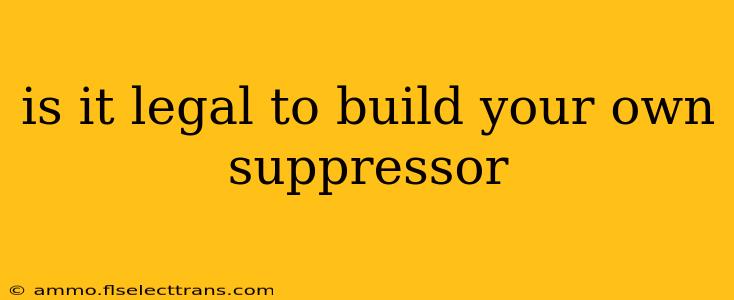The question of whether it's legal to build your own suppressor is complex and depends heavily on your location. The short answer is: generally, no, it is not legal to build your own suppressor in the United States without the proper licenses and permits. This applies to almost all countries as well, though specific laws vary. This guide will explore the legal ramifications, the process for legal suppressor acquisition, and the potential penalties for illegal manufacturing.
The Legality of Homemade Suppressors in the US
The Bureau of Alcohol, Tobacco, Firearms and Explosives (ATF) strictly regulates silencers (suppressors) under the National Firearms Act (NFA) of 1934. This act classifies suppressors as NFA firearms, subjecting them to significant regulatory oversight. Building a suppressor without the necessary licenses and permits is a serious federal crime.
Key Legal Considerations:
- NFA Registration: Any suppressor, regardless of who made it, must be registered with the ATF. This involves a background check and payment of a tax stamp.
- Manufacturing License: To legally manufacture suppressors, you need a Federal Firearms License (FFL) and a special occupational tax stamp. This process is rigorous and requires extensive background checks and adherence to strict regulations.
- Improvised Suppressors: The construction of a suppressor using readily available materials is a particularly severe offense. These devices are often seen as more dangerous due to potential malfunctions and lack of quality control.
Penalties for Illegal Suppressor Manufacturing
The consequences of illegally building a suppressor are significant and can include:
- Federal Prison Time: Sentences can range from several years to decades, depending on the circumstances.
- Substantial Fines: These fines can reach hundreds of thousands of dollars.
- Loss of Gun Rights: A conviction will almost certainly result in the permanent loss of your right to own firearms.
- Other Legal Consequences: Depending on the specifics of the case, other charges could be added, further increasing the severity of the penalties.
Legal Alternatives: Acquiring a Suppressor
Instead of building a suppressor, the legal route involves purchasing one from a licensed dealer. This process includes:
- Finding a Licensed Dealer: Locate a dealer in your state who sells NFA items.
- ATF Form 4: Complete ATF Form 4, the application for a tax stamp. This involves a thorough background check.
- Payment of Tax: Pay the current tax for the NFA item.
- Waiting Period: Expect a significant waiting period, often several months, for approval from the ATF.
International Laws Regarding Suppressor Construction
The legal landscape surrounding suppressor construction varies considerably internationally. Many countries have similar restrictions to the US, with strict regulations and severe penalties for illegal manufacturing. Always research the specific laws in your country before considering any action involving suppressors.
Conclusion: The Risks Far Outweigh the Rewards
Attempting to build your own suppressor is incredibly risky and carries severe legal consequences. The potential penalties – including lengthy prison sentences and significant fines – are far greater than any perceived benefits. If you're interested in owning a suppressor, follow the legal channels to purchase one from a licensed dealer. Remember, ignorance of the law is not a defense. Prioritize safety and legality, and always adhere to all relevant regulations.

